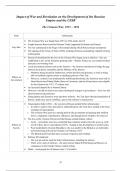Impact of War and Revolution on the Development of the Russian
Empire and the USSR
The Crimean War, 1853 – 1856
Point Information
• The Crimean War was fought from 1853 to 1856, under Alex II
• Fought between Russia and the Ottoman Turks (supported by Britain and France)
Key Info • The war culminated in the Siege of Sevastopol during which Russia troops surrendered
• The signing of the Treaty of Paris (1856), resulting in Russia surrendering valuable territory
in Bessarabia
• Russia felt humiliated by the loss in the Crimean War (Japan seen as inferior) – they are
established as low on the European pecking order – Britain, France etc. are modern/without
autocracy and winning wars
• Local government reforms such as the Zemstva – the Zemstva introduced to bridge the gap
between local police constables and the Ministry of the Interior
o Members being elected by landowners, urbans dwellers and peasants, as well as being
able to feedback regional issues to challenge policies of the Tsar
Effects on
o However, councils were dominated by nobility/professionals, the Zemstvas were only in
Government
Great Russia (not Poland, Baltic States or Caucasus), and not all provinces were eligible
for the Zemstva (by 1917, 37 without one)
• An increased demand for a National Duma
• However, war did not lead to any major ideological changes in government – Alex was still
aimed at preserving autocracy
• Emancipation and Zemstvas were top-down reforms – the Tsar knew that the humiliation of
Russia’s pride may lead to rebellion, and so only reforms to retain power
• Emancipation Edict (1861) – the war proved Russia needed better infrastructure
o In order to achieve this, and achieve industrialisation, the work force needed to be freed,
resulting in Emancipation
o The Crimean War acted as a turning point in the government recognising that serfdom
led to a stagnation of production, efficiency, and thought and it needed to be removed
• The loss of the Crimean War proved that Russia needed military reform:
o Army – serf armies were less committed than volunteer armies from the west e.g. serfs
Effects on revolt in Kiev due to conscription (1855) – leading to the development of a better army
Society o Poor leadership by General Menshikov who was unable to the British at several battles
led to him being relieved by Nicholas I in February 1855
o The British and French had more accurate weaponry and warships
• Railway Development:
o The war proved the need for better infrastructure, including the railway
o There were a lack of railways – the only railway linked St Petersburg and Moscow in
comparison to the Grand Crimean central railway
• Death – most people die of disease (only 1/5 in battle)
42
, • Russia felt humiliated by the loss in the Crimean War – they are established as low on the
European pecking order, and Alex II’s emancipation led to changes in economy:
o Entrepreneurism – start of the push to modernise to compete with the West and establish
themselves as a world power
Effects on
o Agriculture – serfs could now own and cultivate their own land – however, redemption
Economy
taxes, interest, and the controlling nature of the mir limited this impact
o Industry – emancipation was in order to achieve industrialisation – this began the
process of establishing a larger workforce, but had similar limits
• People were allowed to sell surpluses at markets without the permission of the mir
The Russo-Turkish War, 1877 - 1878
Point Information
• The Russo-Turkish War was fought from 1877 to 1878, under Alex II
• The war was fought between Russia and the Balkans and Caucus
Key Info
• Russia fought on two fronts – the Balkans and the Caucus
• Two major sieges Plevna and Kars were won by Russian forces
Effects on • The Treaty of San Stefano reversed many failures from the Crimean War including
Government territorial gains and war indemnity
Effects on • Major benefits to the Slavic population of the Balkans which helps appease the
Society intellectual/middle classes
Effects on • Helped boost confidence in Russian reform that had already taken place – such as, transport
Economy changes, military reform, local government reform
Effects on • There was an upsurge in patriotism, and increased Russification
Nationalities • Antisemitism increases
43




